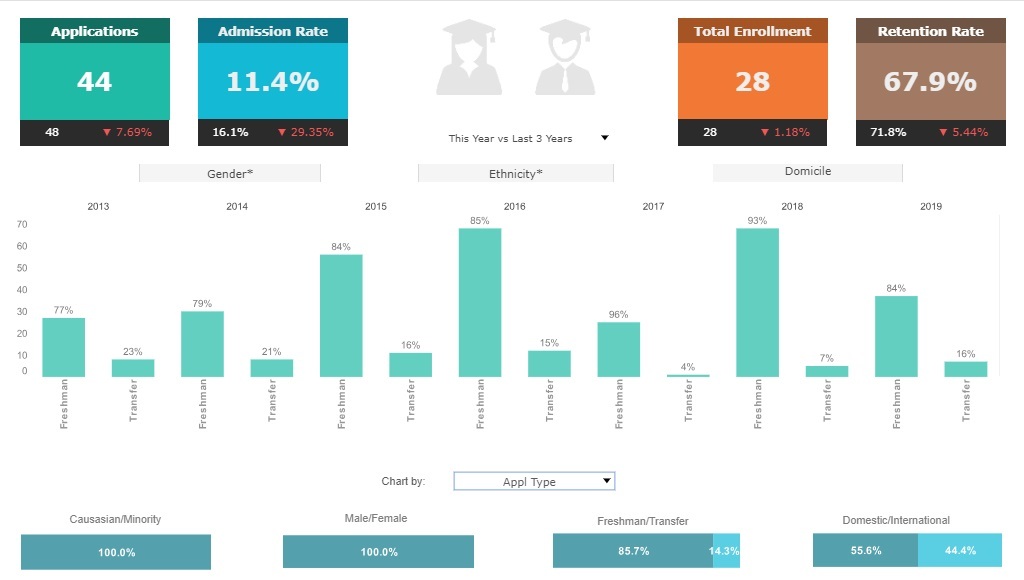Using AI in Education
As the modern-day classroom becomes even more modern with the use of machine learning, AI has spawned a debate on whether this move would benefit everyone or not.
First, consider the students: Will they be treated fairly with AI? Or, will AI still be influenced by bias, and be vulnerable to technical flaws. As for teachers, can AI be an effective teaching tool? Or, will AI rob teachers of their ability to teach?
With so many questions about AI being used in schools, we would have to consider both sides of the argument: the pros and the cons.
Pros?
By next year, educational experts and institutions will welcome AI and machine learning into schools. And, with this next step forward comes the following benefits:
| #1 Ranking: Read how InetSoft was rated #1 for user adoption in G2's user survey-based index | Read More |
1. Easy Career Path Predictions
Machine learning will soon help students determine what careers they want to get into, and what colleges to consider enrolling in. Instead of high school students feeling the pressure of having to choose a school and a career, AI will be able to suggest schools and careers based on their skillset, interests, and abilities. And with those objectives, students can pick a college and career with ease.
2. Accurate Grading
Teachers often grade based on their own bias. But sometimes, that alone can harm students, since there's no unified grading system currently in place. AI hopes to change that with a more precise grading system. Machine learning would accurately evaluate papers based on structure, style, and narrative, and not heavily rely on overall academic performance or class attendance.
3. More Personalized Classrooms
With AI, classrooms are starting to become more and more personalized for students. This would not only help with student engagement, but also let teachers know when a certain student needs more attention. The ultimate goal with this is to bring more equality to the classroom, regardless of each student's abilities.
 |
View a 2-minute demonstration of InetSoft's easy, agile, and robust BI software. |
Cons?
However, AI and machine learning aren't without faults. In fact, since these ideas are still new, there are the cons to consider:
1. Disruption In Socialeconomics
Students go to school to develop skills that they can use for the future, including socioeconomical ones. Socioeconomics opens the door to human mentorship and community; and students should depend on teachers to help them open that door. However, if human interaction is taken out of learning, then there would be no socioeconomics, meaning that more time would be spent on computers and screens, rather than interacting with other people in the real world. Therefore, AI should be a teaching tool to a certain degree, and not replace human teachers.
2. AI As A Means To Abuse Power
In addition, some people may use AI against others. AI may pave the way for bad actors to abuse the algorithms, and target people based on certain data. And, it may prove to be more beneficial to elitists than the lower classes, thus resulting in bias and discrimination. In other words, whoever gets to teach may suddenly get to decide who gets to learn, thus singling out one group to be robbed of getting any education, creating educational gaps.
3. Violates Children's Rights To Data Privacy And Cyber Security
Children cannot consent to having their personal data collected from the Internet, and it's because of this that privacy and security are the biggest issues that AI is up against, especially when it comes to child exploitation. Platforms that connect students worldwide may be exposed to online interactions that aren't kid-friendly. Thus, machine-learning can be an unintentional bastion for people (especially children) to abuse others with explicit messages, pictures, etc. AI-operated platforms must comply with the U.S. Children's Online Privacy Protection Act, or else risk being shut down. Without any moderation, machine-learning can backfire.
4. Possible Grading Errors
Since machine learning is still new, there's still a chance that it can produce unintentional errors in the algorithms. Even with machine-learning grading systems like Graduate Record Examinations (GRE) can still be swayed by human bias. Therefore, there's still room for improvement when implementing AI in grading systems.
 |
View live interactive examples in InetSoft's dashboard and visualization gallery. |
Conclusion
Machine learning has its benefits, as well as its downfalls. However, if people were to take their time in implementing AI in schools, and see what works and what doesn't work, then we would soon learn how to use machine-learning wisely, so that students can effectively learn, and teachers can effectively teach.
About the author: Beatrix Potter writes for Essay Service and Top Middle East writing services. She is also a manager at Australian Help. As a professional writer, she specializes in machine learning and digital trends.


